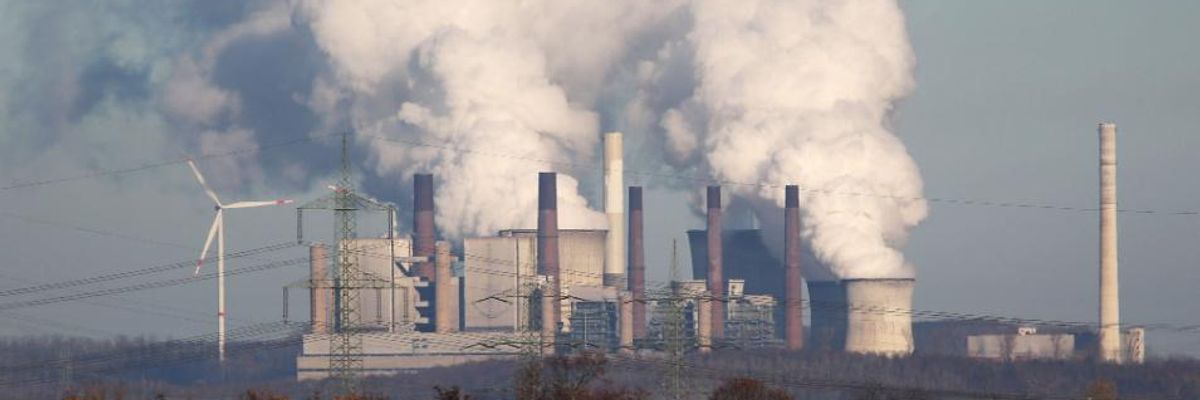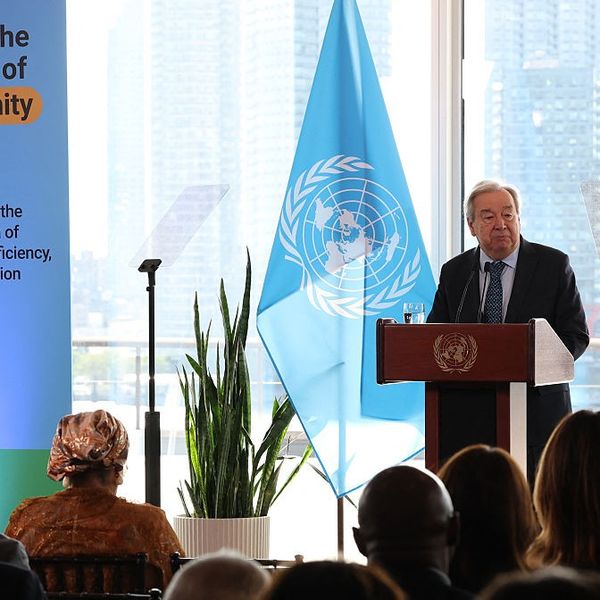
In North Rhine-Westphalia, Germany, wind turbines stand adjacent to a coal-fired power plant on November 18, 2020. (Photo: Oliver Berg/picture alliance via Getty Images)
Cancel All Coal Projects to Have 'Fighting Chance' Against Climate Crisis, Says UN Chief
"Phasing out coal from the electricity sector is the single most important step to get in line with the 1.5 degree goal."
Emphasizing that the world still has a "fighting chance" to limit global warming with immediate and ambitious climate action, United Nations Secretary-General Antonio Guterres on Tuesday urged governments and the private sector to cancel all planned coal projects, cease financing for coal-fired power plants, and opt instead to support a just transition by investing in renewable energy.
"Once upon a time, coal brought cheap electricity to entire regions and vital jobs to communities," Guterres said in a video message at the virtual meeting of the Powering Past Coal Alliance. "Those days are gone."
"Phasing out coal from the electricity sector is the single most important step to get in line with the 1.5 degree goal," Guterres continued, referring to the policy objective of preventing planetary temperatures from rising more than 1.5 degC above pre-industrial levels. "Global coal use in electricity generation must fall by 80% below 2010 levels by 2030," he added.
Meeting the 1.5 degC climate target over the course of this decade is possible, according to Guterres, but will require eliminating "the dirtiest, most polluting and, yes, more and more costly fossil fuel from our power sectors."
\u201cToday, I call on all governments, private companies & local authorities to take 3 #ClimateAction steps:\n\nCancel all global coal projects in the pipeline.\n\nEnd coal plant financing & shift investment to renewable energy projects.\n\nJump-start a global effort to a just transition.\u201d— Ant\u00f3nio Guterres (@Ant\u00f3nio Guterres) 1614716400
In his address, the U.N. chief outlined three steps that must be taken by public authorities as well as companies to "end the deadly addiction to coal."
- Cancel all global coal projects in the pipeline;
- End the international financing of coal plants and shift investment to renewable energy projects; and
- Jump-start a global effort to finally organize a just transition.
Guterres called on the 37 members of the Organization for Economic Cooperation and Development (OECD)--a group of relatively rich countries with a greater historical responsibility for extracting fossil fuels and emitting the greenhouse gasses that are causing deadly pollution and destroying the climate--to "commit to phasing out coal" by 2030, while urging non-OECD countries to do so by 2040.
Pleading for an end to the global bankrolling of coal projects and a move toward supporting developing countries in transitioning to clean energy, Guterres asked "all multilateral and public banks--as well as investors in commercial banks or pension funds--to shift their investments now in the new economy of renewable energy."
While stressing that "the transition from coal to renewable[s] will result in the net creation of millions of jobs by 2030," Guterres acknowledged that "the impact on regional and local levels will be varied."
"We have a collective and urgent responsibility to address the serious challenges that come with the speed and scale of the transition," he continued. "The needs of coal communities must be recognized, and concrete solutions must be provided at a very local level."
The U.N. chief urged "all countries to embrace the International Labor Organization's guidelines for a just transition and adopt them as minimum standard to ensure progress on decent work for all."
The coronavirus pandemic, Guterres noted, has "accelerated" the decline in "coal's economic viability," while recovery plans provide an opportunity to bring about a green transformation of the world's infrastructure.
In many parts of the world, a just transition dovetails with guaranteeing universal access to energy, said Damilola Ogunbiyi, CEO and special representative of the secretary-general for Sustainable Energy for All.
Ogunbiyi told conference attendees that almost 800 million people worldwide still lack access to basic electricity, while 2.8 billion are without clean cooking fuels.
"Right now, we're at a crossroads where people do want to recover better, but they are looking for the best opportunities to do that," she said. "And we're emphasizing investments in sustainable energy to spur economic development, create new jobs, and give opportunities to fulfill the full potential."
An Urgent Message From Our Co-Founder
Dear Common Dreams reader, The U.S. is on a fast track to authoritarianism like nothing I've ever seen. Meanwhile, corporate news outlets are utterly capitulating to Trump, twisting their coverage to avoid drawing his ire while lining up to stuff cash in his pockets. That's why I believe that Common Dreams is doing the best and most consequential reporting that we've ever done. Our small but mighty team is a progressive reporting powerhouse, covering the news every day that the corporate media never will. Our mission has always been simple: To inform. To inspire. And to ignite change for the common good. Now here's the key piece that I want all our readers to understand: None of this would be possible without your financial support. That's not just some fundraising cliche. It's the absolute and literal truth. We don't accept corporate advertising and never will. We don't have a paywall because we don't think people should be blocked from critical news based on their ability to pay. Everything we do is funded by the donations of readers like you. The final deadline for our crucial Summer Campaign fundraising drive is just days away, and we’re falling short of our must-hit goal. Will you donate now to help power the nonprofit, independent reporting of Common Dreams? Thank you for being a vital member of our community. Together, we can keep independent journalism alive when it’s needed most. - Craig Brown, Co-founder |
Emphasizing that the world still has a "fighting chance" to limit global warming with immediate and ambitious climate action, United Nations Secretary-General Antonio Guterres on Tuesday urged governments and the private sector to cancel all planned coal projects, cease financing for coal-fired power plants, and opt instead to support a just transition by investing in renewable energy.
"Once upon a time, coal brought cheap electricity to entire regions and vital jobs to communities," Guterres said in a video message at the virtual meeting of the Powering Past Coal Alliance. "Those days are gone."
"Phasing out coal from the electricity sector is the single most important step to get in line with the 1.5 degree goal," Guterres continued, referring to the policy objective of preventing planetary temperatures from rising more than 1.5 degC above pre-industrial levels. "Global coal use in electricity generation must fall by 80% below 2010 levels by 2030," he added.
Meeting the 1.5 degC climate target over the course of this decade is possible, according to Guterres, but will require eliminating "the dirtiest, most polluting and, yes, more and more costly fossil fuel from our power sectors."
\u201cToday, I call on all governments, private companies & local authorities to take 3 #ClimateAction steps:\n\nCancel all global coal projects in the pipeline.\n\nEnd coal plant financing & shift investment to renewable energy projects.\n\nJump-start a global effort to a just transition.\u201d— Ant\u00f3nio Guterres (@Ant\u00f3nio Guterres) 1614716400
In his address, the U.N. chief outlined three steps that must be taken by public authorities as well as companies to "end the deadly addiction to coal."
- Cancel all global coal projects in the pipeline;
- End the international financing of coal plants and shift investment to renewable energy projects; and
- Jump-start a global effort to finally organize a just transition.
Guterres called on the 37 members of the Organization for Economic Cooperation and Development (OECD)--a group of relatively rich countries with a greater historical responsibility for extracting fossil fuels and emitting the greenhouse gasses that are causing deadly pollution and destroying the climate--to "commit to phasing out coal" by 2030, while urging non-OECD countries to do so by 2040.
Pleading for an end to the global bankrolling of coal projects and a move toward supporting developing countries in transitioning to clean energy, Guterres asked "all multilateral and public banks--as well as investors in commercial banks or pension funds--to shift their investments now in the new economy of renewable energy."
While stressing that "the transition from coal to renewable[s] will result in the net creation of millions of jobs by 2030," Guterres acknowledged that "the impact on regional and local levels will be varied."
"We have a collective and urgent responsibility to address the serious challenges that come with the speed and scale of the transition," he continued. "The needs of coal communities must be recognized, and concrete solutions must be provided at a very local level."
The U.N. chief urged "all countries to embrace the International Labor Organization's guidelines for a just transition and adopt them as minimum standard to ensure progress on decent work for all."
The coronavirus pandemic, Guterres noted, has "accelerated" the decline in "coal's economic viability," while recovery plans provide an opportunity to bring about a green transformation of the world's infrastructure.
In many parts of the world, a just transition dovetails with guaranteeing universal access to energy, said Damilola Ogunbiyi, CEO and special representative of the secretary-general for Sustainable Energy for All.
Ogunbiyi told conference attendees that almost 800 million people worldwide still lack access to basic electricity, while 2.8 billion are without clean cooking fuels.
"Right now, we're at a crossroads where people do want to recover better, but they are looking for the best opportunities to do that," she said. "And we're emphasizing investments in sustainable energy to spur economic development, create new jobs, and give opportunities to fulfill the full potential."
Emphasizing that the world still has a "fighting chance" to limit global warming with immediate and ambitious climate action, United Nations Secretary-General Antonio Guterres on Tuesday urged governments and the private sector to cancel all planned coal projects, cease financing for coal-fired power plants, and opt instead to support a just transition by investing in renewable energy.
"Once upon a time, coal brought cheap electricity to entire regions and vital jobs to communities," Guterres said in a video message at the virtual meeting of the Powering Past Coal Alliance. "Those days are gone."
"Phasing out coal from the electricity sector is the single most important step to get in line with the 1.5 degree goal," Guterres continued, referring to the policy objective of preventing planetary temperatures from rising more than 1.5 degC above pre-industrial levels. "Global coal use in electricity generation must fall by 80% below 2010 levels by 2030," he added.
Meeting the 1.5 degC climate target over the course of this decade is possible, according to Guterres, but will require eliminating "the dirtiest, most polluting and, yes, more and more costly fossil fuel from our power sectors."
\u201cToday, I call on all governments, private companies & local authorities to take 3 #ClimateAction steps:\n\nCancel all global coal projects in the pipeline.\n\nEnd coal plant financing & shift investment to renewable energy projects.\n\nJump-start a global effort to a just transition.\u201d— Ant\u00f3nio Guterres (@Ant\u00f3nio Guterres) 1614716400
In his address, the U.N. chief outlined three steps that must be taken by public authorities as well as companies to "end the deadly addiction to coal."
- Cancel all global coal projects in the pipeline;
- End the international financing of coal plants and shift investment to renewable energy projects; and
- Jump-start a global effort to finally organize a just transition.
Guterres called on the 37 members of the Organization for Economic Cooperation and Development (OECD)--a group of relatively rich countries with a greater historical responsibility for extracting fossil fuels and emitting the greenhouse gasses that are causing deadly pollution and destroying the climate--to "commit to phasing out coal" by 2030, while urging non-OECD countries to do so by 2040.
Pleading for an end to the global bankrolling of coal projects and a move toward supporting developing countries in transitioning to clean energy, Guterres asked "all multilateral and public banks--as well as investors in commercial banks or pension funds--to shift their investments now in the new economy of renewable energy."
While stressing that "the transition from coal to renewable[s] will result in the net creation of millions of jobs by 2030," Guterres acknowledged that "the impact on regional and local levels will be varied."
"We have a collective and urgent responsibility to address the serious challenges that come with the speed and scale of the transition," he continued. "The needs of coal communities must be recognized, and concrete solutions must be provided at a very local level."
The U.N. chief urged "all countries to embrace the International Labor Organization's guidelines for a just transition and adopt them as minimum standard to ensure progress on decent work for all."
The coronavirus pandemic, Guterres noted, has "accelerated" the decline in "coal's economic viability," while recovery plans provide an opportunity to bring about a green transformation of the world's infrastructure.
In many parts of the world, a just transition dovetails with guaranteeing universal access to energy, said Damilola Ogunbiyi, CEO and special representative of the secretary-general for Sustainable Energy for All.
Ogunbiyi told conference attendees that almost 800 million people worldwide still lack access to basic electricity, while 2.8 billion are without clean cooking fuels.
"Right now, we're at a crossroads where people do want to recover better, but they are looking for the best opportunities to do that," she said. "And we're emphasizing investments in sustainable energy to spur economic development, create new jobs, and give opportunities to fulfill the full potential."

